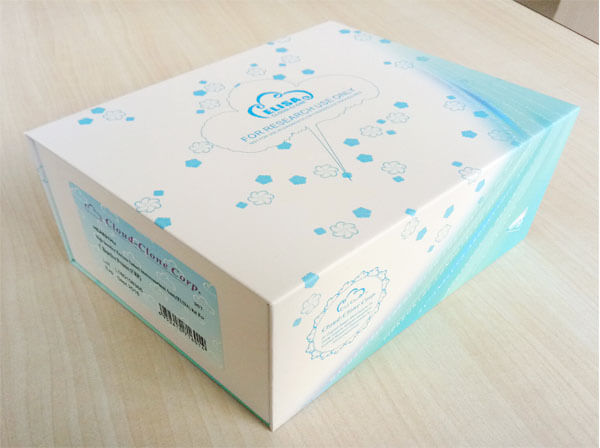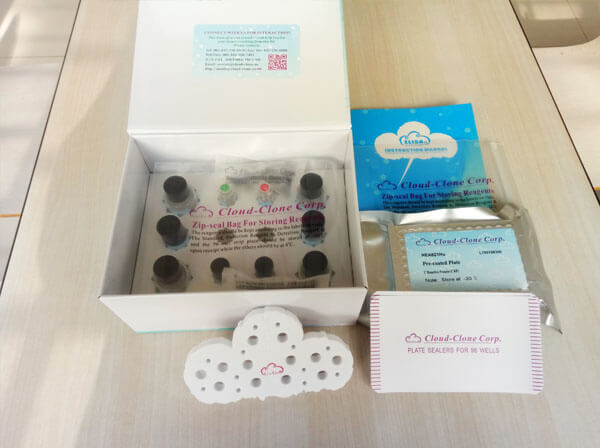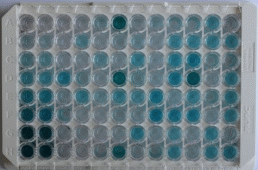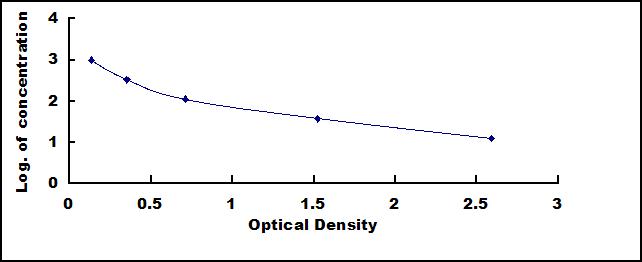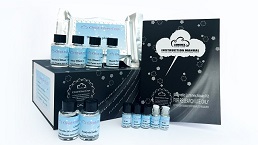Instant ELISA Kit for Cortisol (Cor) 

Hydrocortisone
- UOM
- FOB US$ 643.00 US$ 918.00 US$ 4,131.00 US$ 7,803.00 US$ 64,260.00
- Quantity
Overview
Properties
- Product No.IEA462Ge
- Organism SpeciesPan-species (General) Same name, Different species.
- ApplicationsEnzyme-linked immunosorbent assay for Antigen Detection.
Research use only - DownloadInstruction Manual
- CategoryMetabolic pathwayEndocrinologyHormone metabolism
Sign into your account
Share a new citation as an author
Upload your experimental result
Review

Contact us
Please fill in the blank.
Recovery
Matrices listed below were spiked with certain level of Instant Cortisol (Cor) and the recovery rates were calculated by comparing the measured value to the expected amount of Instant Cortisol (Cor) in samples.
| Matrix | Recovery range (%) | Average(%) |
| serum(n=5) | 96-103 | 101 |
| EDTA plasma(n=5) | 99-105 | 102 |
| heparin plasma(n=5) | 84-103 | 98 |
Precision
Intra-assay Precision (Precision within an assay): 3 samples with low, middle and high level Instant Cortisol (Cor) were tested 20 times on one plate, respectively.
Inter-assay Precision (Precision between assays): 3 samples with low, middle and high level Instant Cortisol (Cor) were tested on 3 different plates, 8 replicates in each plate.
CV(%) = SD/meanX100
Intra-Assay: CV<10%
Inter-Assay: CV<12%
Linearity
The linearity of the kit was assayed by testing samples spiked with appropriate concentration of Instant Cortisol (Cor) and their serial dilutions. The results were demonstrated by the percentage of calculated concentration to the expected.
| Sample | 1:2 | 1:4 | 1:8 | 1:16 |
| serum(n=5) | 79-92% | 97-105% | 80-98% | 89-96% |
| EDTA plasma(n=5) | 80-95% | 78-102% | 91-104% | 92-101% |
| heparin plasma(n=5) | 96-104% | 85-101% | 84-93% | 78-90% |
Stability
The stability of kit is determined by the loss rate of activity. The loss rate of this kit is less than 5% within the expiration date under appropriate storage condition.
To minimize extra influence on the performance, operation procedures and lab conditions, especially room temperature, air humidity, incubator temperature should be strictly controlled. It is also strongly suggested that the whole assay is performed by the same operator from the beginning to the end.
Reagents and materials provided
| Reagents | Quantity | Reagents | Quantity |
| Pre-coated, ready to use 96-well strip plate | 1 | Plate sealer for 96 wells | 4 |
| Standard | 5 | Standard Diluent | 1×20mL |
| Detection Reagent A | 1×120µL | Assay Diluent A | 1×12mL |
| TMB Substrate | 1×9mL | Stop Solution | 1×6mL |
| Wash Buffer (30 × concentrate) | 1×20mL | Instruction manual | 1 |
Assay procedure summary
1. Prepare all reagents, samples and standards;
2. Add 50µL standard or sample to each well.
And then add 50µL prepared Detection Reagent A immediately.
Share and mix. Incubate 50 minutes at 37°C;
3. Aspirate and wash 3 times;
4. Add 100µL prepared Detection Reagent B. Incubate 10 minutes at 37°C;
5. Aspirate and wash 5 times;
6. Add 90µL Substrate Solution. Incubate 10-20 minutes at 37°C;
7. Add 50µL Stop Solution. Read at 450nm immediately.

Test principle
This assay employs the competitive inhibition enzyme immunoassay technique. A monoclonal antibody specific to Instant Cortisol (Cor) has been pre-coated onto a microplate. A competitive inhibition reaction is launched between biotin labeled Instant Cortisol (Cor) and unlabeled Instant Cortisol (Cor) (Standards or samples) with the pre-coated antibody specific to Instant Cortisol (Cor). After incubation the unbound conjugate is washed off. Next, avidin conjugated to Horseradish Peroxidase (HRP) is added to each microplate well and incubated. The amount of bound HRP conjugate is reverse proportional to the concentration of Instant Cortisol (Cor) in the sample. After addition of the substrate solution, the intensity of color developed is reverse proportional to the concentration of Instant Cortisol (Cor) in the sample.
Giveaways
Increment services
Citations
- Use of infrared thermography to assess the influence of high environmental temperature on rabbitsScienceDirect: S0034528813001380
- Identification of sociodemographic and clinical factors associated with the levels of human b-defensin-1 and human b-defensin-2 in the human milk of Han ChinesePubmed:24124699
- Daily exposure to summer circadian cycles affects spermatogenesis, but not fertility in an in vivo rabbit modelPubmed:25442388
- Effect of high temperatures on breeding rabbit behaviourPublish:Source
- Assessment of cortisol as salivary psychological stress marker in relation to temporomandibular disorders among a sample of dental studentsIndex.Php: Jbcd
- Sea buckthorn (Hippophae rhamnoides L.) oil protects against chronic stress-induced inhibitory function of natural killer cells in ratsPubMed: 26684638
- Surface plasmon resonance immunoassay for cortisol determination with a self-assembling denaturalised bovine serum albumin layer on surface plasmon resonance chipxpls:7393900
- Fabrication and characterization of SPR chips with the modified bovine serum albuminarticle:10.1007
- Effect of thermal stress on physiological, hormonal and haematological parameters in Tharparkar and Karan Fries calvespublication:306322503
- Relationship between the indexes of insulin resistance and metabolic status in dairy cows during early lactationacve-2017-0006
- Hypothalamus-pituitary-adrenal axis involves in anti-viral ability through regulation of immune response in piglets infected by highly pathogenic porcine …Pubmed:29540178
- Endurance exercise causes adverse changes in some hematological and physio-biochemical indices in ponies under high altitude stress condition:
- Effects of feeding frequency during lactation in primiparous sows on reproduction performance and diurnal rhythm of endocrine profiles at the weaning-to-ovulation …
- Physiological Performance of Crossbred Cattle Calves (Karan Fries) under Different Housing Conditions during Different Seasons
- A study on certain blood biomarkers of pregnant Cholistani cows.
- The Use of Infrared Thermography (IRT) as Stress Indicator in Horses Trained for Endurance: A Pilot StudyPubmed: 30866503
- Saliva cortisol, melatonin levels and circadian rhythm alterations in Chinese primary school children with dyslexiaPubmed: 32028434
- Assessment of certain biomarkers for predicting survival in response to treatment in dogs naturally infected with canine parvovirusPubmed: 32926999
- Effects of dietary nucleotides on growth, survival and metabolic response in whiteleg shrimp, Litopenaeus vannamei against ammonia stress condition
- Physiological responses to salinity stress in the Managua Cichlid, Cichlasoma managuense
- Anti-stress activity of some plants extracts of the North Caucasus flora
- Effect of alfalfa hay and starter feed supplementation on caecal microbiota and fermentation, growth, and health of yak calves33610512
- Exploring alterations in hematological and biochemical parameters, enzyme activities and serum cortisol in Besnoitia besnoiti naturally infected dairy cattle33722267
- Post©\Cardiac Arrest Hydrocortisone Use Ameliorates Cardiac Mitochondrial Injury in a Male Rat Model of Ventricular Fibrillation Cardiac Arrest33960200
- The Protective Role of Alpha-Ketoglutaric Acid on the Growth and Bone Development of Experimentally Induced Perinatal Growth-Retarded Piglets33435211
- Stress response after race and endurance training sessions and competitions in Arabian horses33497894
- Associations of Chinese social face with cortisol level and glucocorticoid receptor gene
- Orexin-A/OX1 Receptor Regulates Autophagy, Mitochondrial Autophagy, and Cortisol Secretion in Human Adrenocortical Cells Through the mTORC1/P70s6k1 …



